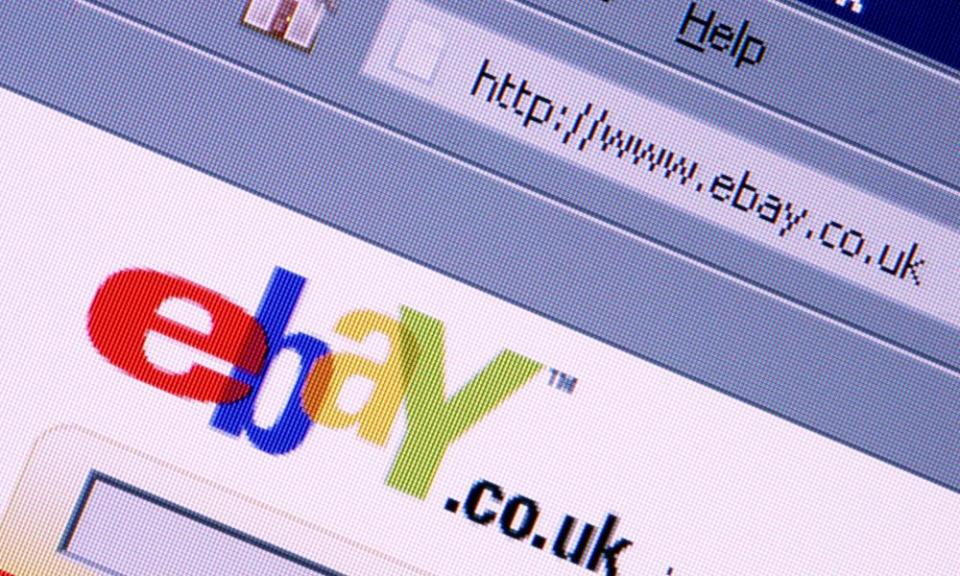Selling online: how to clear your clutter on eBay and beyond

If you found your inner Marie Kondo during lockdown, or you just have a heap of stuff you no longer need, is it time to list it on one of the host of websites that will sell it for you – in some cases for free?
On 25 September eBay is celebrating its 25th birthday.
But while it remains the go-to destination for those selling used items, there are many specialist websites offering to list your items, often charging lower fees.
If you are ready to start selling, here are the options and what you need to know.
eBay

Not many websites have “sellerbrated” a 25th birthday – yes, it launched in 1995 – and the online auctioneer remains the first port of call for those shifting their excess stuff. It is easy to use and you can list almost anything on the site. Its main advantage is its scale, meaning your items will be viewed by the widest number of potential buyers, hopefully resulting in you getting the best price for them. You can either opt to auction the item or sell it for a fixed price using the “buy it now” option.
However, eBay will take 10% commission on the final sales price and postage, capped at £250, as well as a further 2.9% plus 30p if the buyer pays via PayPal – which virtually everyone does. This means that if you sell a breadmaker for £100, and charge £10 for packing and delivery, you will only receive £85.51 after eBay has had its share. Every so often eBay has “sell for £1 max” weekends, which can increase how much you get to keep considerably.
You can also pay direct by bank card.
Another caveat is that unscrupulous buyers are targeting people selling high-value items on the site. Guardian Money has highlighted a number of cases in which eBay/Paypal has forced sellers to refund buyers who claimed that the item wasn’t in the parcel when it arrived, or was damaged. They get away with it because eBay typically sides with buyers when there is such a dispute.
One reader recently lost £450 after selling a pair of rare trainers on eBay. Despite packaging and photographing them carefully, the buyer who had never bought an item before claimed the trainers were in poor condition and demanded his money back. The problem is getting so bad that some sellers have stopped listing high-value items items on eBay – see below. Try to deal only with highly rated buyers, or better still insist on cash on collection.
Gumtree

The main advantage Gumtree has for sellers is that it is completely free to use. It is owned by eBay and is effectively an online version of the small ads that used to appear in local newspapers.
It is a good place to sell larger items that can only be picked up in person. Unlike eBay there are no protections in place, so you need to keep your wits about you.
Buyers and sellers generally agree to meet in person to hand over the goods – ideally at neutral destination – and you should insist on being paid in cash. The downside is that your potential market will be restricted to those buyers who are local to you or prepared to travel.
Buyers need to be aware that lots of stolen items end up on Gumtree, particularly bikes. There are also a lot of scammers posting vehicles and other high-value items on the site. Never send money via a bank transfer for an item listed on Gumtree or any other website, unless you have seen it in person.
Vinted

This is fast becoming the go-to site for selling clothes. It works pretty much like eBay, with sellers creating a profile and listing the items they wish to sell, complete with photos. They also set the price they want and feedback is given at the end by buyer and seller. The crucial difference between this site and eBay is that listings are free, and the company’s much more agreeable 4% commission is paid by the buyer.
Once a sale is agreed the buyer pays Vinted, by card or via PayPal, and as a seller you have to send the item within five days. You get paid four days after it arrives and the buyer is happy. Buyers can only return items for a refund if the item is not as described or damaged.
Alternatively, sellers can choose to be credited to their Vinted account, so that they can spend their gains on some new (secondhand) clothes of their own.
Depop

Depop is fashion eBay for teenagers – more than half of its users are aged 14 to 24 – and if that’s your target market, it is worth logging on to see what the fuss is all about. It is free to list items and you pay a 10% commission on the items you sell.
The market is driven by two groups – Instagram influencers hyping up their products and entrepreneurial teenagers selling on stuff they bought elsewhere. It is all done on a mobile app..
Payments are made by PayPal (with its 3.4% fee) and there is a seller protection in place that is similar to eBay’s in that you can only send the item to the buyer’s confirmed address.
musicMagpie

If you have lots of old music CDs, vinyl, DVDs or used tech to sell, musicMagpie, which has been around since 2007, is worth a go. Rather than you listing lots of items for sale and then having to trudge down the the post office with each one, you sell the lot to the site and there’s a rather nifty barcode scanner to make this easy. You simply download it then scan in your CDs, films, etc, then you will get a quote for the items – it naturally pays more for in-demand items. These are then packed into a single box and sent off to musicMagpie. The money is paid into your bank or PayPal account on receipt of the goods.
In recent years and months the company has started buying used mobile phones and tablets in the same way. The problem with selling such things to firms is that they will frequently lower the offer when they receive the item and assess its condition.
Most tests of the DVD-buying sites such as this one suggest that you will get more money selling the items yourself on eBay, so this is the best choice only if you really don’t want to spend a lot of time on sthe process. A 2018 test of the DVD-buying services by LoveMoney found that Computer Exchange (CeX) offered the best price for a collection of films, etc.
Facebook Marketplace

Arguably the biggest threat to eBay’s dominance, not least because of the reach of Facebook but also because there are no fees to sell items. Again, it is an electronic version of the small ads. Users simply go to their news feed, click on Marketplace and follow the comprehensive listing instructions.
There is no payment mechanism, meaning that you have to meet up with the buyer, hand over the goods and collect the cash. It works best for those living in large urban areas, where there is a ready market for your items.
It is less hassle than selling items on eBay and you are not losing 13% of the sales price in fees. Baby items and kids paraphernalia do very well, as do items of furniture and in-demand items such as Wiis or TVs. It is also a growing place to offer unwanted items for free – just select £0 when you list.
Be aware that Facebook won’t get involved in disputes between sellers and buyers, so there is little comeback if you have problems. Buyers are often unreliable and just won’t turn up. When MoneySavingExpert put Facebook up against eBay in April last year, it reckoned that Facebook won for 14 out of 20 items sold, once the fees were factored in. Definitely worth a go, unless you live in the Scottish Highlands or anywhere similarly remote.
The best of the rest
Ziffit is less well known but very similar to musicMagpie. It also offers a free courier and collection service, so you just need to pack up your items in a box. We Buy Books is another site that uses a barcode reader to give you an instant valuation. Despite the name, it also buys CDs, games and DVDs, and is currently offering a 10% bonus to new customers. Lastly, if you have antique items including jewellery, watches and other more valuable items that you want to shift, try Vintage Cash Cow. It gets good reviews from its customers.
All the above make you an offer that you either accept or decline, so there are no fees to pay.
What can’t you sell online?

While the sites vary somewhat, most of them have a pretty long list of the items that you are not alloweed to sell. EBay has the longest list and is typical in banning the sale of most live animals, with the exception of bees, mice and lobsters. Illegal drugs, drug paraphernalia and drug-like substances are not allowed. Tools to allow locks to be picked are banned, as are firearms of any kind. There is a an amusing page on how sellers should list adult items. Sex toys can be offered but have to be in the Sexual Wellness, section. Used electrical items are being sold on the site in huge numbers, although technically they have to meet the Plugs and Sockets etc (Safety) Regulations 1994.
On Facebook Marketplace, sellers are not allowed to sell a shorter list of items including anything that isn’t a physical product. Equally, the sale of services, such as housecleaning, is barred.
On Gumtree, live pets can be sold but strictly no Nazi memorabilia or human organs. The rather long list of prohibited items rather dispels the myth that anything goes on Gumtree.
Seller frustrated by eBay over figurine dispute
One seller who is seriously disillusioned after listing items on eBay is Melanie Easton, from Newport, south Wales. The housing officer is facing a £900 loss after she drove three hours to deliver a collection of 41 porcelain figurines she had sold for £2,300.
The buyer inspected each one on delivery and even messaged Easton as she drove the three hours home to say how thrilled she was with the purchase. The buyer also left a positive review of the transaction.
I have been through the appeals process but it’s like they are not reading what I have said
Seller Melanie Easton
However, when a few days later the buyer contacted her to complain that nine of the figurines were damaged and as a result she wanted £900 back.
“These figurines were in excellent condition when I delivered them, so had been damaged while in their possession. I have refused the refund but eBay is backing her even though they have agreed that she has changed her story and had ample time to examine the goods when I delivered them.
“I have been through the appeals process but it’s like they are not reading what I have said or are just ignoring it,” she says.
Because the buyer paid using PayPal, Easton has been told that it will take the money back – putting her account into debt. Had she taken the cash on delivery, the buyer could not have gone down this route.
“I paid eBay £229 in fees and opted to use Paypal because I thought it was safer. I know now that it has just given an unscrupulous buyer the chance to take £900 back from me,” she says.
EBay told us it had placed the case on hold in the hope that the buyer and seller could reach a resolution and shortly before we went to press Easton told us that the seller had withdrawn the claim.

 Yahoo Finance
Yahoo Finance 